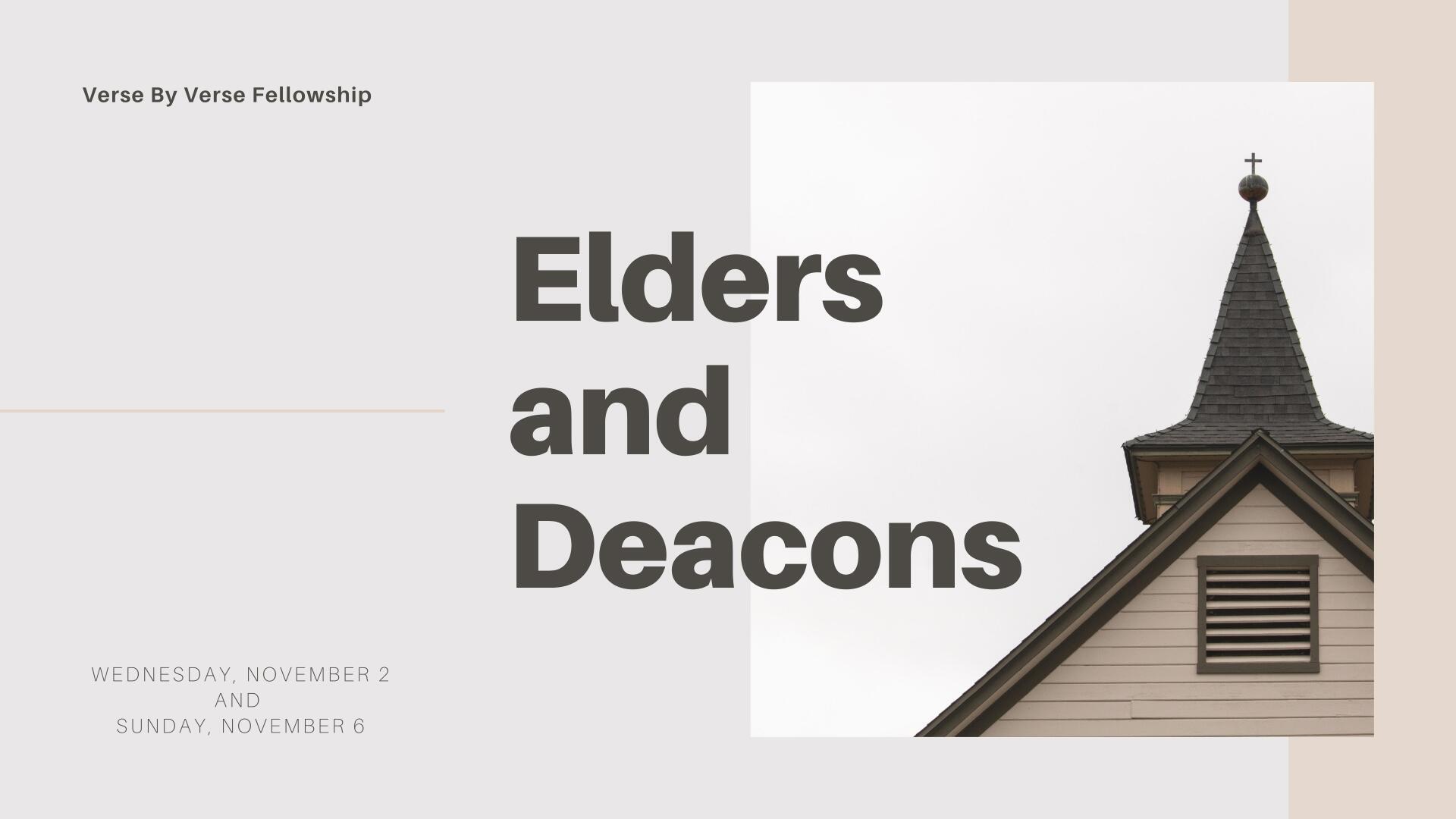Sunday Service 9am & 11am
Wednesday Service 7pm
(210) 920-6502
551 E Nakoma St.
San Antonio, TX 78216
Join a small group to study this sermon with like-minded believers.
I Peter 4:1-11
LISTEN. STUDY. APPLY.
Video
Audio
Manuscript
1 Peter 4A
Good evening, Verse by Verse family. I hope that you’ve had a wonderful day and I thank you for coming out this evening.
Before we begin with our passage of text, lets review our memory verse in 1 Peter 4:19 which says, “Therefore let those who suffer according to God's will entrust their souls to a faithful Creator while doing good.”
What an encouraging verse to memorize! We get to trust our souls to a faithful Creator while doing good!
As we enter 1 Peter chapter 4 today, I would like to piggyback off the word “suffer” found in our memory verse.
The word “suffer,” or a variation of that word like “suffered” or “suffering” appears 18 times in 1 Peter and much of its contextual use is in relation to suffering for doing good and the majority contextual example given to us is that Christ also suffered for doing good.
And this is where 1 Peter 4:1-11 picks up. Let’s go ahead and read it all the way through and then we will look at each specific verse after a quick overview of these passages.
1 Peter 4:1–11 “Since therefore Christ suffered in the flesh, arm yourselves with the same way of thinking, for whoever has suffered in the flesh has ceased from sin, 2 so as to live for the rest of the time in the flesh no longer for human passions but for the will of God. 3 For the time that is past suffices for doing what the Gentiles want to do, living in sensuality, passions, drunkenness, orgies, drinking parties, and lawless idolatry. 4 With respect to this they are surprised when you do not join them in the same flood of debauchery, and they malign you; 5 but they will give account to him who is ready to judge the living and the dead. 6 For this is why the gospel was preached even to those who are dead, that though judged in the flesh the way people are, they might live in the spirit the way God does. 7 The end of all things is at hand; therefore be self-controlled and sober-minded for the sake of your prayers. 8 Above all, keep loving one another earnestly, since love covers a multitude of sins. 9 Show hospitality to one another without grumbling. 10 As each has received a gift, use it to serve one another, as good stewards of God’s varied grace: 11 whoever speaks, as one who speaks oracles of God; whoever serves, as one who serves by the strength that God supplies—in order that in everything God may be glorified through Jesus Christ. To him belong glory and dominion forever and ever. Amen.”
4:1-11 Overview
I would like to provide you with a quick overview of this passage of text before we begin to dive into each Scripture.
In this passage of text, Peter draws a conclusion from the earlier paragraph in chapter 3:18–22 with the word “therefore.” In 3:18–22, Peter states that the suffering of Jesus was the pathway to His victory and exaltation to the right hand of the Father.
In verse 1, Peter exhorts us to suffer in the flesh just as Jesus suffered in the flesh and points out that this decision to suffer in the flesh indicates that we have ceased to let sin have dominion over us.
In verse 2, Peter supplies the reason for the exhortation he gives in verse 1 by saying that we should commit ourselves to suffer in the flesh so that we may live out the will of God throughout the rest of our life.
Peter then tells his readers in verse 3 that they already had ample time to live like the Gentiles – in a life of unrestrained depravity.
In verse 4, Peter acknowledges that his reader’s former friends were astonished by their decision and reviled both them and their God for no longer living in debauchery.
In verse 5 Peter reminds his readers that the reviling of unbelievers is not the last word. God, at the conclusion of human history, will judge the living and dead. Ultimately, the wicked will be condemned for their evil lives and their mistreatment of believers. Peter implied from this that it would be folly for believers to relapse into a pagan lifestyle, even though they currently faced hostility and criticism.
At the end of the day, Peter’s readers will be vindicated, and the wicked will be judged, and so they should resist any temptation to revert to their pagan ways and join the company of those who will be judged.
In verse 6 Peter explained that the gospel was declared to believers while they were still alive so that they would live in the spirit in God’s presence, even though they would still face physical death. In other words, physical death is not the last word for believers. The gospel promises that they will ultimately be raised from the dead.
This is the same promise that we have today. We will ultimately be raised from the dead and be made alive in Christ!
Verses 5–6 conclude with a reference to the final judgment, and Peter reprised that theme in verse 7a with a reminder that the end is near. Hence, he returned to the main theme of the previous paragraph. Since the end is near, believers should live according to God’s will. What this means in practice is that we should be alert and sober for prayer, that we should live in sacrificial love that includes hospitality, and that we should use our gifts, whether speaking or serving, to help others.
In other words, our aim and motivation in all we do is to see God glorified through Jesus Christ.
Now, let’s read our fist passage of Scripture and begin to examine each Scripture individually.
1 Peter 4:1
1 Peter 4:1 “Since therefore Christ suffered in the flesh, arm yourselves with the same way of thinking, for whoever has suffered in the flesh has ceased from sin,”
The first clause here in verse 1 explains why we should expect to suffer – because Christ also “suffered in the flesh.” The wording here calls back to chapter 3:18, where both the verb “suffer[ed]” (paschō) and the noun “flesh” (sarx) occurs.
As noted in the overview, the word “therefore” draws a conclusion from the previous verses of 1 Peter 3:18–22, where Christ’s absolute victory over hostile powers by virtue of his death and resurrection is featured.
The connection between the two sections is this: since Christ’s suffering is the pathway to glory, we should also be prepared to suffer, knowing that suffering is the prelude to an eschatological reward.
The main point of the verse is that we are to arm themselves (hoplisasthe) with the intention to suffer for Christ. The term “arm yourselves” has military connotations, and in other texts like Romans 6:13 and 13:12, 2 Corinthians 6:7 and 10:4, Ephesians 6:11–17 and 1 Thessalonians 5:8 the Christian life is compared to the life of a warrior.
The military language here indicates that discipline and grit are needed to live the Christian life, particularly in view of the suffering we will encounter as those who place our trust in Jesus.
We must arm ourselves with the “attitude” that suffering is inevitable byproduct of trusting in our amazing God.
Like soldiers preparing for battle, we should prepare ourselves for suffering.
This leads us to the most difficult part of the verse, “…for whoever has suffered in the flesh has ceased from sin...”
Scholars are in debate about the interpretation of this passage of Scripture, however there are three different interpretations.
Some scholars believe that the one who suffered could be identified as Jesus Christ. The objection to this view is that Jesus never sinned, so how could it be said that he had ceased from sin?
This interpretation could be defended if sin is understood in terms like Romans 6:8–10 which says:
“8 Now if we have died with Christ, we believe that we will also live with him. 9 We know that Christ, being raised from the dead, will never die again; death no longer has dominion over him. 10 For the death he died he died to sin, once for all, but the life he lives he lives to God.”
By virtue of Jesus’ death and resurrection, the power of sin was broken, and Christ ceased to have any relationship with sin. At the cross the sinless one took sin upon Himself, but now that He has suffered, He no longer deals with sin. His triumph over it is complete.
This interpretation is an attractive in that it removes any implication that believers could somehow be sinlessly perfect. It is difficult to see how believers are done with sin in this life, but it makes good sense to say that Christ was done with sin once for all at the cross.
Nonetheless, this interpretation should be rejected.
It is hardly clear that the phrase “whoever has suffered” refers to Christ. The subject is almost surely believers, for the syntax of the text indicates that those who arm themselves are to be equated with those who suffer.
The singular form here is generic and should not be forced as if the reference were to a solitary individual. The need to posit Christ as the subject can be eliminated if we show that there are plausible ways of speaking of Christians as ceasing from sin without importing any idea that believers are sinless.
The second interpretation, is this: the one who suffers in the flesh refers to Christians, but it should be understood in terms like Romans 6:7, “For one who has died has been set free from sin...”
In Romans 6 believers died with Christ and to the power of sin. Similarly, the verse here says that the dominion of sin has been broken in the lives of those who have died with Christ. The advantage of this interpretation is that it conforms with Paul and sensibly explains how believers cease with sin.
Still, this interpretation should be rejected. We must beware of imposing the Pauline writings on 1 Peter, and the two contexts are quite different.
It is apparent in Romans 6 that the believer dies with Christ, but no such language is used in 1 Peter. In fact, the word “suffered” in the last phrase of verse 1 cannot be equated with dying. Paul spoke metaphorically of dying with Christ whereas Peter had in mind actually suffering for Christ.
We should note that the verb used is “suffer” (paschō), not “die” (apothēnskō). The notion here is not that believers have died with Christ but that they should follow Christ in their daily lives by consenting to suffering.
Further, Peter did not use the word “sin” (hamartia) to designate a power, something that is quite common in Paul. The word “sin” in Peter is used in relation to acts of sin.
Here is the third interpretation – “whoever has suffered” refers to believers and relates back to the imperative to prepare themselves for suffering.
Peter explained why we should be prepared to suffer, seeing the commitment to suffer as evidence that we have broken with a life of sin.
The point here is NOT that believers who suffer have attained sinless perfection, as if they do not sin at all after suffering. What Peter emphasized was that those who commit themselves to suffer, those who willingly endure scorn and mockery for their faith, show that they have triumphed over sin.
They have broken with a pattern of sin because they have ceased to participate in the sinful activities of unbelievers, and they have endured the criticisms that have come from making this decision. The commitment to suffer shows a passion for a new way of life, a life that is not yet perfect but remarkably different from the lives of unbelievers in the Greco-Roman world.
1 Peter 4:2
1 Peter 4:2 “so as to live for the rest of the time in the flesh no longer for human passions but for the will of God.”
We should arm ourselves with the intention to suffer, so that we may live out the remainder of our life to carrying out God’s will instead of fulfilling the human lusts that dominated our lives before conversion.
The purpose clause provides confirmation for the interpretation proposed for the last clause in verse 1. Believers are summoned to suffer in the sense that they are called to do God’s will and to turn away from a life of sin.
Some scholars think the remaining time on earth is understood as the short time before the second coming of Christ rather than the rest of one’s life before death. But we need not choose between these two options, for the text is not specific enough to warrant one or the other.
Peter realized that some Christians would likely die before Christ returned while still anticipating the imminent return of Christ. Whatever the span of life God grants, we are to live zealously for God as long as life endures.
1 Peter 4:3
1 Peter 4:3 “For the time that is past suffices for doing what the Gentiles want to do, living in sensuality, passions, drunkenness, orgies, drinking parties, and lawless idolatry.”
The word “for” (gar) that introduces verse 3 explains why believers should live the rest of their lives for God’s will.
They have already spent sufficient time (arketos) in the past carrying out “what the Gentiles want to do” The use of the word “will” (boulēma) in verse 2 establishes a contrast between verses 2 and 3.
This contrast shows us that there is a great difference between God’s will and the Gentiles’ will.
Peter is saying that we should live for the “will” (thelēma) of God, however he does note that before our conversion we devoted ourselves to the will of the Gentiles.
In saying that the time past “suffices” to have lived as unbelievers, Peter’s point was that it is more than enough, that there is no room now for any involvement with the sinful lifestyle of unbelievers.
From here, Peter then sketches a vice list for the unbelievers.
The words “sensuality” (epithymia) may refer to sexual sin here, but it could also be used as a general term for sin. The combination of sexual sin, drinking, and parties apparently was common in the Greco-Roman world, as it is today.
The word for “drunkenness” (oinophlygia) occurs only here in the New Testament, but Deuteronomy 21:20 uses a verbal form of the word to describe a drunkard (oinophlygeō).
The word “Orgies” (kōmoi) used here refers to sexual parties. These sexual parties are also condemned in Romans 13:13 and Galatians 5:21, and in both, these texts are also linked with drunkenness.
The term for “drinking parties” (potos) occurs only here in the New Testament, and it refers to “social drinking parties.”
I define these words because it is evident that these people lived a dissolute life before their conversion and the same thing could be said about us prior to our conversion.
Now the last item mentioned is their “lawless idolatry.”
The reference to idolatry indicates that the readers were not Jews but Gentiles, for overt idolatry did not characterize the Jewish communities. The word “lawless” does not focus on lack of conformity to the law but to an unholy and profane lifestyle that was lived by the Gentiles.
In addition, the sins listed in verse 3, though not absent from Jewish people, were not typical among religiously devout Jews.
1 Peter 4:4
1 Peter 4:4 “With respect to this they are surprised when you do not join them in the same flood of debauchery, and they malign you;”
Because Peter’s readers no longer participated in the activities listed in verse 3, their neighbors “are surprised” that Christians have forsaken their past lifestyle.
In this verse we are reminded we, as Christians, are sojourners and exiles in this world.
We do not share the values and aspirations of the surrounding society, and we do not fit into the social fabric of society.
What surprises unbelievers is that we do not “join” (syntrechontōn) into or participate in their immoral way of living.
Essentially, unbelievers are surprised that we do not participate in what they consider to be normal cultural activities – and in response they criticize, defame, and revile us and by doing so they also revile the God we worship.
This verse is vitally important for understanding the nature of the persecution in 1 Peter.
There is little evidence of state-sponsored persecution that robbed early believers of their lives. Instead, unbelievers were at first puzzled and then outraged by the failure of believers to participate in activities that were a normal part of Greco-Roman culture.
We see such a reaction in Tacitus when he says Christians have a “hatred of the human race” (Ann. 15.44). Pagans would feel this way because idolatry was woven into almost every dimension of their lives, from life in the home to public festivals to religious observances and even social occasions.
In the Western world we take for granted the segregation of private and public spheres, but public festivals, in which the gods were worshiped, were considered a civic duty in the Greco-Roman world. In particular, the worship of the emperor was simply a mark of good citizenship, and the deifying of the emperor was especially pronounced in Asia Minor.
Those who failed to participate in these worship activities would quickly become social outcasts. We can easily see that those who did not fit in with the norms of society would be discriminated against in daily life and that they would be the object of abuse.
Understanding these types of specific features of persecution in 1 Peter is important, because we often tend to restrict persecution to imprisonment, physical deprivation, torture, and execution. And I as noted, there is little evidence in 1 Peter for this type of persecution.
Peter’s readers were mistreated by being socially ostracized. We should not overlook that criticism because social ostracism often leads to more severe action.
In other words, sharp words can easily turn into sharp swords.
We don’t have to look very far back into history to see this fact of social ostracism. All we need to do is look back to Hitler and we can see that the Jewish people were first ostracized and then brutally murdered by the thousands.
1 Peter 4:5
1 Peter 4:5 “but they will give account to him who is ready to judge the living and the dead.”
As is so often the case in the letter, Peter turned the readers’ eyes toward the judgment Day. Currently unbelievers may have been enjoying the favor and privileges of Greco-Roman society. They may have been experiencing social advancement and the praise of their peers. They may have been in the “in crowd” while the Peter’s readers were on the outside – living as social outcasts.
Their circumstances and our present circumstances are not the last word though.
Those who live now for their own passions and revile believers will be judged by God on the last day. They will need to “give account” to God.
The phrase “give account” (apodōsousin logon) is courtroom language, referring to the final judgment here.
With this knowledge, we should not succumb to the temptation to renounce our faith so we can enjoy the approval of society. Such approval is short-lived, and those who mistreat believers now will be judged in the future.
I want to pause here for a moment and say something. Peter did not mention the final judgment of unbelievers to encourage us to think vindictively. Nor did he address these words to unbelievers.
He reminded believers of the final judgment of all, assuring them that their perseverance in the faith matters and that those who practice evil will be assessed and condemned on the final day. Hence, they must not align themselves with the oppressors to escape society’s discrimination, because the tables will be quickly turned.
1 Peter 4:6
1 Peter 4:6 “For this is why the gospel was preached even to those who are dead, that though judged in the flesh the way people are, they might live in the spirit the way God does.”
The question we must ask here is “What did Peter mean by the word ‘dead’ (nekrois) here?”
The answer to that question is that Peter considered the case of believers who had died already physically. These people had heard and believed the gospel when they were alive but had subsequently died.
With this in mind, Peter goes on to create a contrast here between the “flesh” and “spirit” and makes a parallel connection to 1 Peter 3:18 which says:
“For Christ also suffered once for sins, the righteous for the unrighteous, that he might bring us to God, being put to death in the flesh but made alive in the spirit,”
Peter’s point here is that believers may die physically but they will be raised to life by the Holy Spirit.
1 Peter 4:7
1 Peter 4:7 “The end of all things is at hand; therefore be self-controlled and sober-minded for the sake of your prayers.”
The previous paragraph ended with a reference to the final judgment, death, and the resurrection. So, it should not surprising us to see that verse 7 opens with a reference to the end of history. The reason the end is near is that the ministry, death, and resurrection of Jesus Christ have initiated the last days).
In the New Testament the theme that the end of history is imminent is often mentioned. All the following exhortations in this paragraph draw an inference from the coming of the end and because the end is near, believers should live in the following way.
We might expect a call for extraordinary behavior, thinking something unusual would be demanded of us because the end is near. However, Peter exhorted us to pursue virtues that are a normal part of New Testament.
What is striking in the paragraph is how Peter shifted from a focus on relationship with outsiders to how believers should relate to one another.
Peter exhorted his readers and us to be “self-controlled and sober-minded.”
What is fascinating about this is that the word “pray” is attached to both verbs. The nearness of the end could lead some believers to lose their heads and act irrationally, however we should think sensibly as we contemplate how short our life is.
Our sensible and alert thinking is then to be used for prayer. We are called to ask God to act and move in the time that remains. The realization that God is bringing history to a close should provoke us to depend on him, and this dependence is manifested in prayer, for in prayer we recognize that any good that occurs in the world is due to God’s grace.
1Peter 4:8
1 Peter 4:8 “Above all, keep loving one another earnestly, since love covers a multitude of sins.”
The imminence of the end should also provoke us to keep loving others.
The importance of such constancy in love has already been underlined in 1 Pet 1:22, and the theme is broached again because love is central in the Christian life. Indeed, Jesus himself warned that love is apt to grow cold at the end of the age (Matt 24:12). Given this, there is a need to continue to stoke the fires of love, so that it is displayed to others.
In the second half of this verse Peter provides the reason as to why love should be pursued – the reason given is that love “covers over a multitude of sins.”
I want to make something clear here, expressing or showing love to one another does not atone for your own sins.
This passage means that when believers lavish love on others, the sins and offenses of others are overlooked.
We also need to understand that love is directed to others, not oneself.
Genuine love is displayed to others through hospitality, and gifts are employed to serve others, not oneself.
1 Peter 4:9
1 Peter 4:9 “Show hospitality to one another without grumbling.”
The theme of love continues in verse 9. We need to remember that these exhortations are all shaped by the nearness of the end.
Hospitality was one of the marks of the Christian community. Hospitality was particularly crucial for the Christian mission in a day when lodging could not be afforded, and the advance of the mission depended on the willingness of believers to provide bed and board for those visiting.
Hospitality was necessary in order for the church to meet in various homes.
The words “without grumbling” acknowledge that those who open their homes may grow tired of the service. However, Peter exhorted to be hospitable, not caving in to the temptation to withhold their charity from others.
1 Peter 4:10
1 Peter 4:10 “As each has received a gift, use it to serve one another, as good stewards of God’s varied grace:”
The theme of ministering to one another continues here in verse 10, but the emphasis shifts to gifts believers have received by God’s grace.
The word “gift” (charisma) implies that the gifts believers have are the result of God’s grace, and the word “received” makes this pretty clear to us.
What is most important, of course, is the purpose for having gifts. Gifts are not given so that believers can congratulate themselves on their abilities. Gifts are bestowed on us “to serve one another.”
The point is that spiritual gifts are given to serve and to help others, to strengthen others in the faith. They are given for ministry, not to enhance self-esteem.
When we use our gifts to strengthen others, we are functioning as “good stewards” of God’s grace.
Spiritual gifts are not fundamentally a privilege but a responsibility – a call to be faithful to what God has given us.
1 Peter 4:11
1 Peter 4:11 “whoever speaks, as one who speaks oracles of God; whoever serves, as one who serves by the strength that God supplies—in order that in everything God may be glorified through Jesus Christ. To him belong glory and dominion forever and ever. Amen.”
The gifts are divided into two categories, speaking and serving gifts.
Again, all gifts involve serving and edifying others, and Peter was not denying that emphasis here.
However, Peter does go on to examines the gifts functionally, observing that some involve speaking and others serve fellow believers in a variety of ways. In placing the gifts into the two categories of speaking and serving, all the spiritual gifts are included under these two classes.
In his listing of the gifts Paul provided more detail, so that we have some idea which gifts would fall under speaking, and which would fall under serving (Rom 12:6–7; 1 Cor 12:10, 28–30; Eph 4:11; Rom 12:8; 1 Cor 12:9–10, 28–30).
Those who speak should endeavor to speak “the very words of God.”
The “the very words of God” refer to the words God has given his people.
Using speaking gifts to minister to others means that the one speaking endeavors to speak God’s words. How easy it is to think that we can assist others with our own wisdom, but those who are entrusted with the ministry of speaking should be careful to speak God’s words, to be faithful to the gospel.
Peter wrote so that those who speak will do so in accord with the gospel, not to suggest that the words spoken become part of the revelational deposit for believers.
Similarly, those who minister and serve others must not rely on their own strength. They must minister “with the strength God provides,” relying on his power to carry out their tasks.
God receives the glory because He is the One who has provided the wisdom and strength for ministry. The Provider is always the One who is praised.
Peter concluded this section with a doxology. The doxology signals the end of this major section of the letter, from 2:11–4:11.
In Conclusion
Before we close today, I would like to challenge you to do the following:
1. Arm yourselves with the knowledge that you will suffer in this life.
2. Resist the temptation to return to your old life because of social pressures.
3. Live by the Spirit of God.
4. Know that life is short and that the end is at hand.
5. Be self-controlled and sober minded and let that help guide your prayer life.
6. Use your gifts for others and not yourself.
7. Give glory to God for all that He has done in your life.

Taught by Matthew McWaters
Associate Pastor of Verse By Verse Fellowship
1 Peter Series

LATEST SERMONS
BROWSE THE LATEST SERMONS








